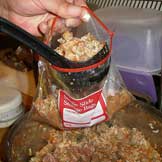
The term “food allergy” is overused. Owners and even some veterinarians will call any adverse reaction to a food an allergy. In some cases, the difference is primarily semantic since the most effective form of treatment is going to be avoiding the offending substance regardless of the underlying physiological reaction. But for the sake of accuracy I thought I’d talk a little about what makes a food allergy a food allergy.
Oftentimes, the more correct term to use is “adverse food reaction.” The American Academy of Allergy, Asthma, and Immunology puts it this way:
“Adverse food reaction” is a broad term indicating a link between an ingestion of a food and an abnormal response.
Reproducible adverse reactions may be caused by: a toxin, a pharmacological effect, an immunological response, or a metabolic disorder.
Food allergy is a term that is used to describe adverse immune responses to foods that are mediated by IgE antibodies that bind to the triggering food protein(s); the term is also used to indicate any adverse immune response toward foods (e.g., including cell mediated reactions).
I explain it to clients this way: When a dog is truly allergic to an ingredient in his food (almost always a protein), his body is misidentifying that protein as being part of an invading microorganism and launching an immune response against it. While the inflammation that results is beneficial in controlling infectious diseases or parasitism, it has only deleterious effects in the case of a food allergy.
In a review of 278 cases of canine food allergy, the following ingredients were most often to blame (some dogs were allergic to more than one substance, which is why the numbers below add up to more than 278):
Beef – 95 cases
Dairy – 55 cases
Wheat – 42 cases
Chicken – 24 cases
Egg – 18 cases
Lamb – 13 cases
Soy – 13 cases
Corn – 7 cases
Pork – 7 cases
Fish – 6 cases
Rice – 5 cases
Most food allergic dogs have one or more of the following symptoms:
- itching, which may be localized to the face or hind end or affect most of the body
- recurrent ear infections
- evidence of gastrointestinal upset such as diarrhea, vomiting, or excessive gassiness
Obviously, none of these clinical signs are specific to food allergies or even adverse food reactions, so a thorough diagnostic work up, including a food trial with an elimination diet (one made from novel protein and carbohydrate sources) or a hydrolyzed diet is in order. If the symptoms resolve on the new diet and return when the old is reintroduced, you know the old food was to blame in some way, but you still can’t be completely sure that an allergic reaction was to blame.
I suspect the misdiagnosis of other types of adverse food reactions as allergies explains why food allergies are often said to have a variable response to steroids, a standard treatment for all sorts of allergic reactions. My guess is that most of the dogs who respond to steroids do have food allergies, and the ones that don’t are suffering from a non-allergic adverse food reaction.

Dr. Jennifer Coates
Image: aerogondo2 / Shutterstock









